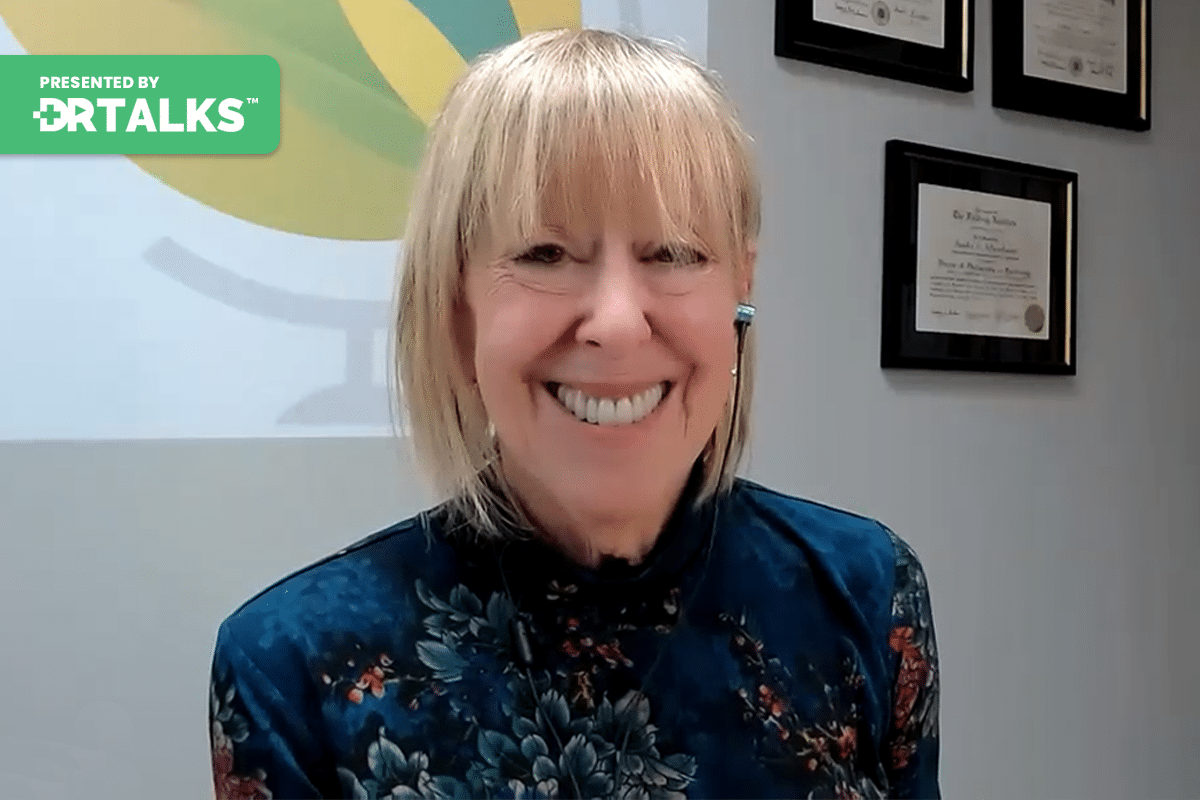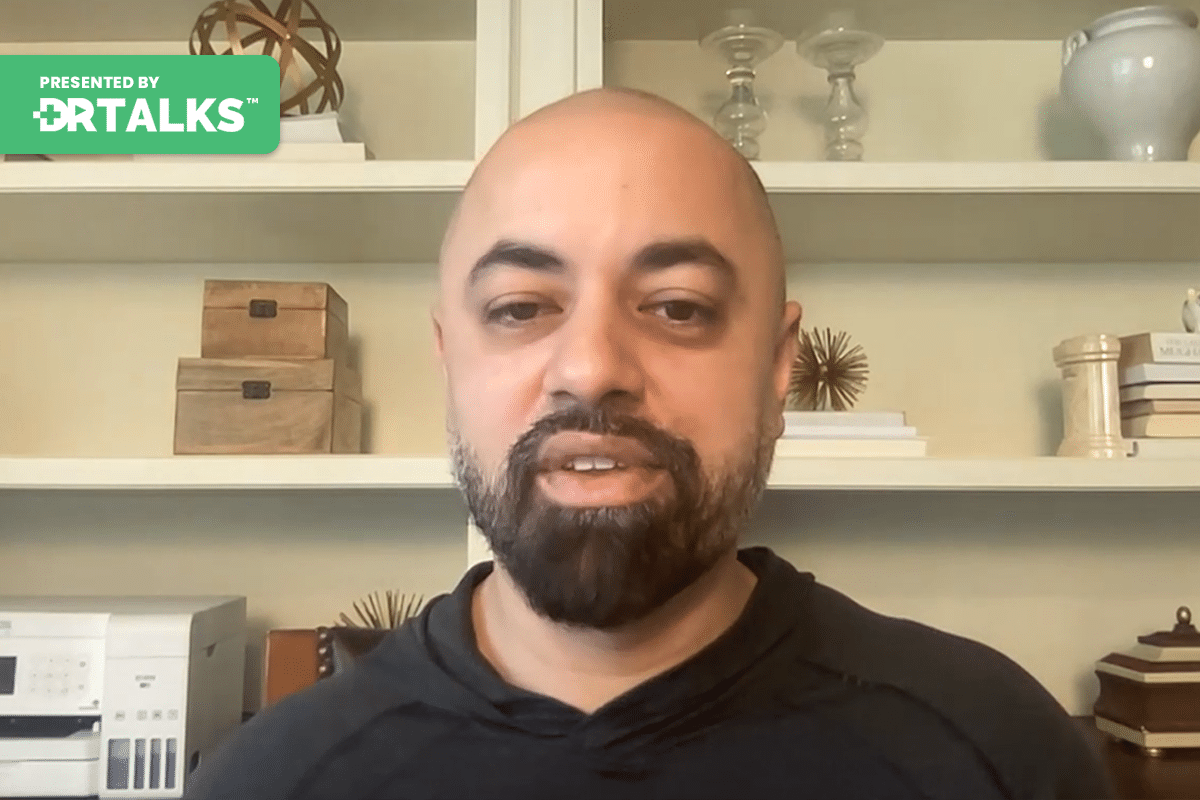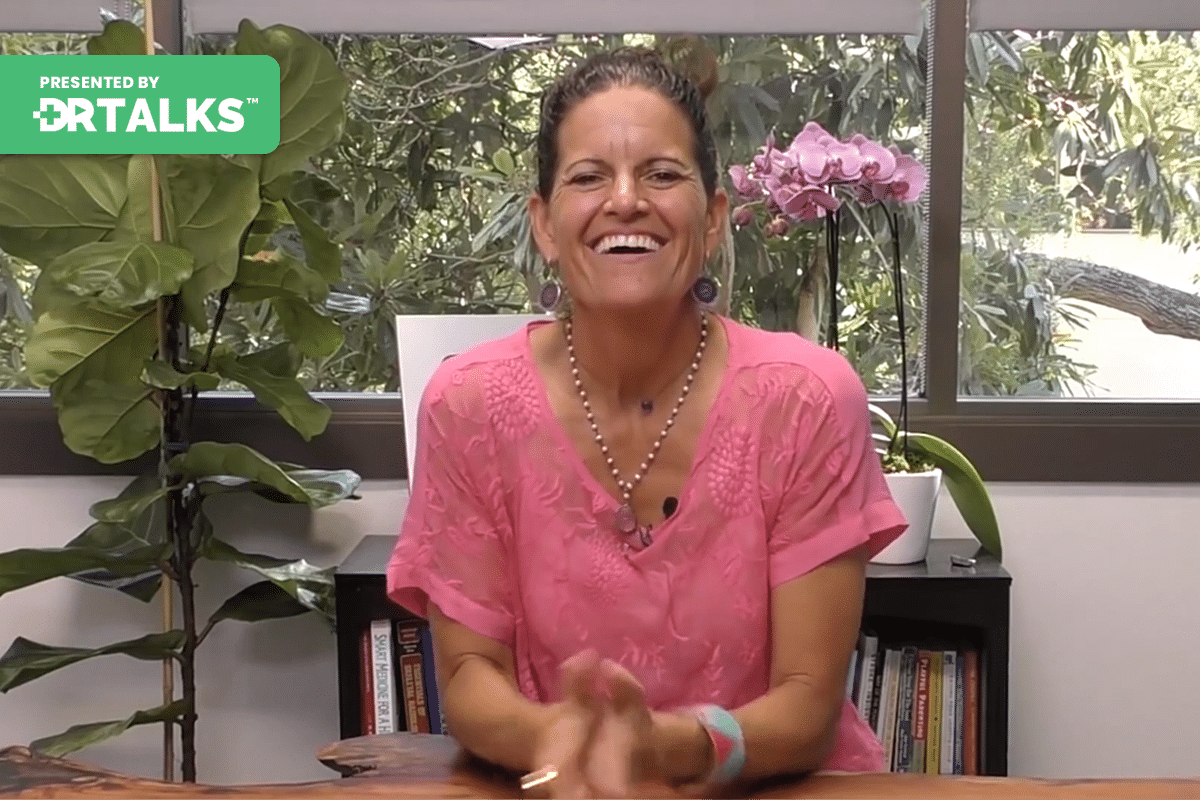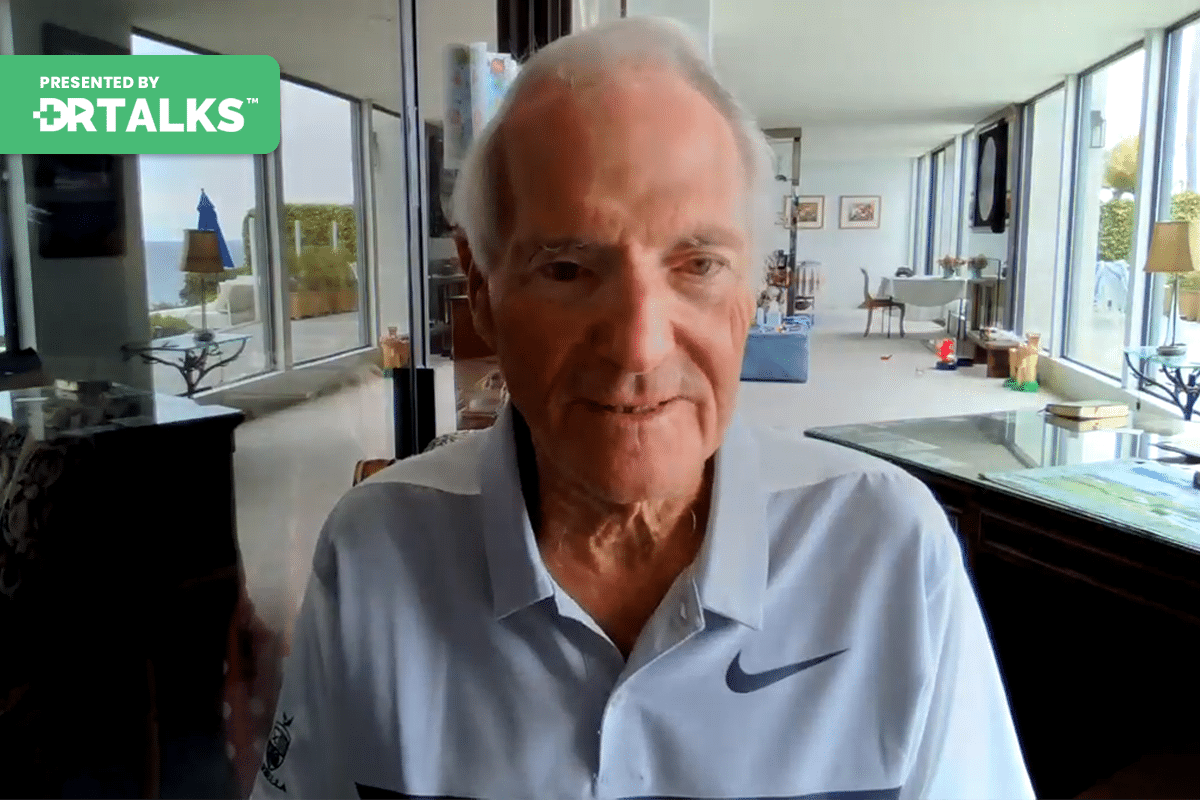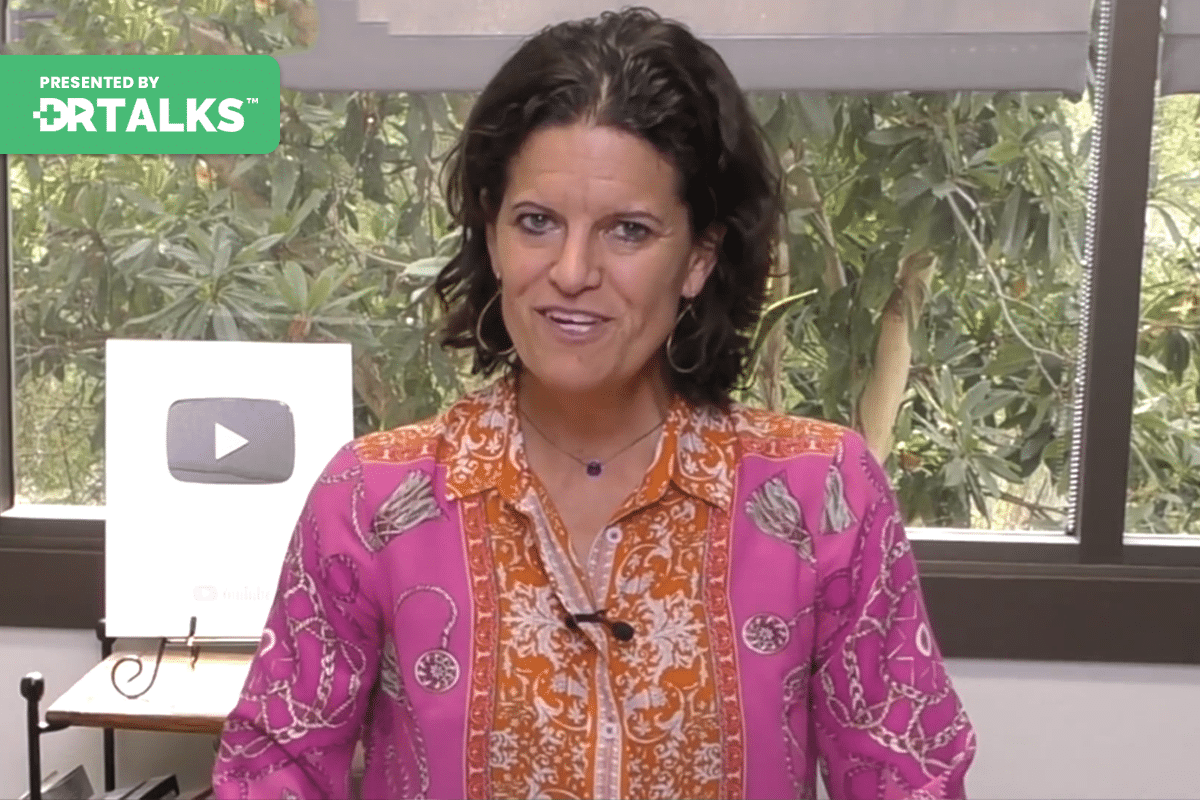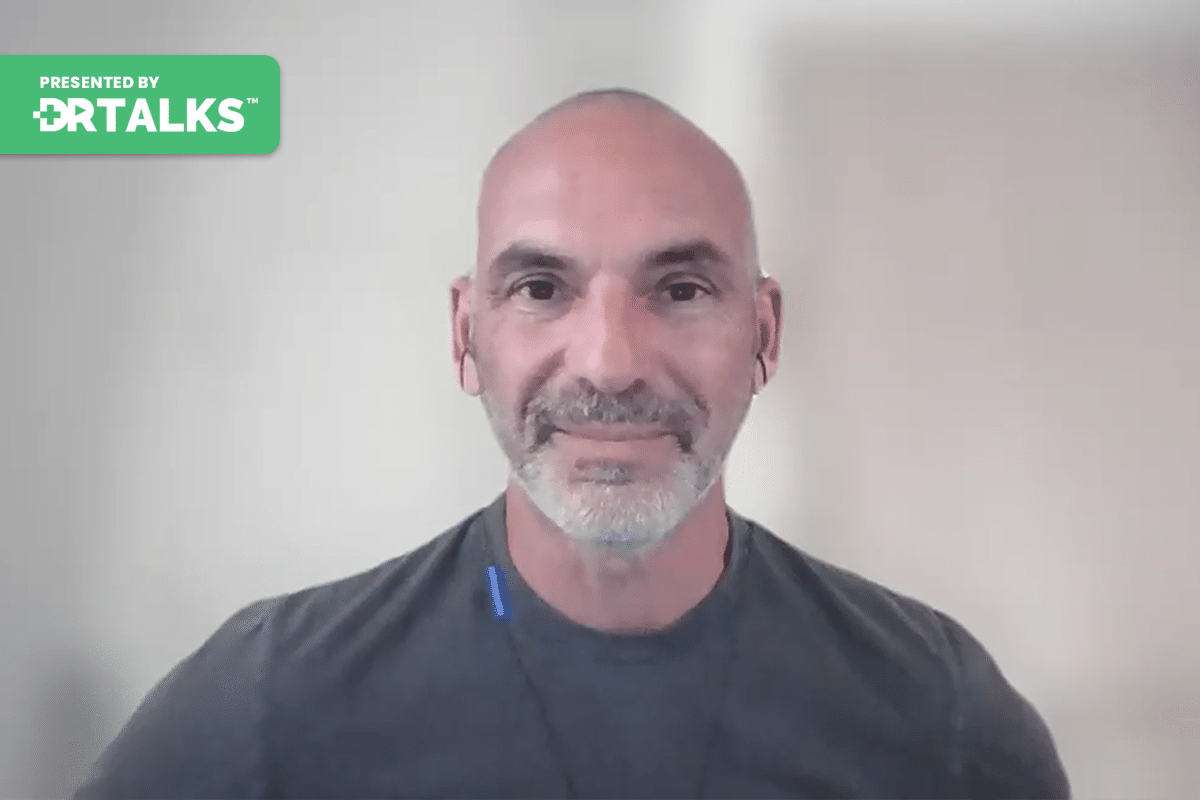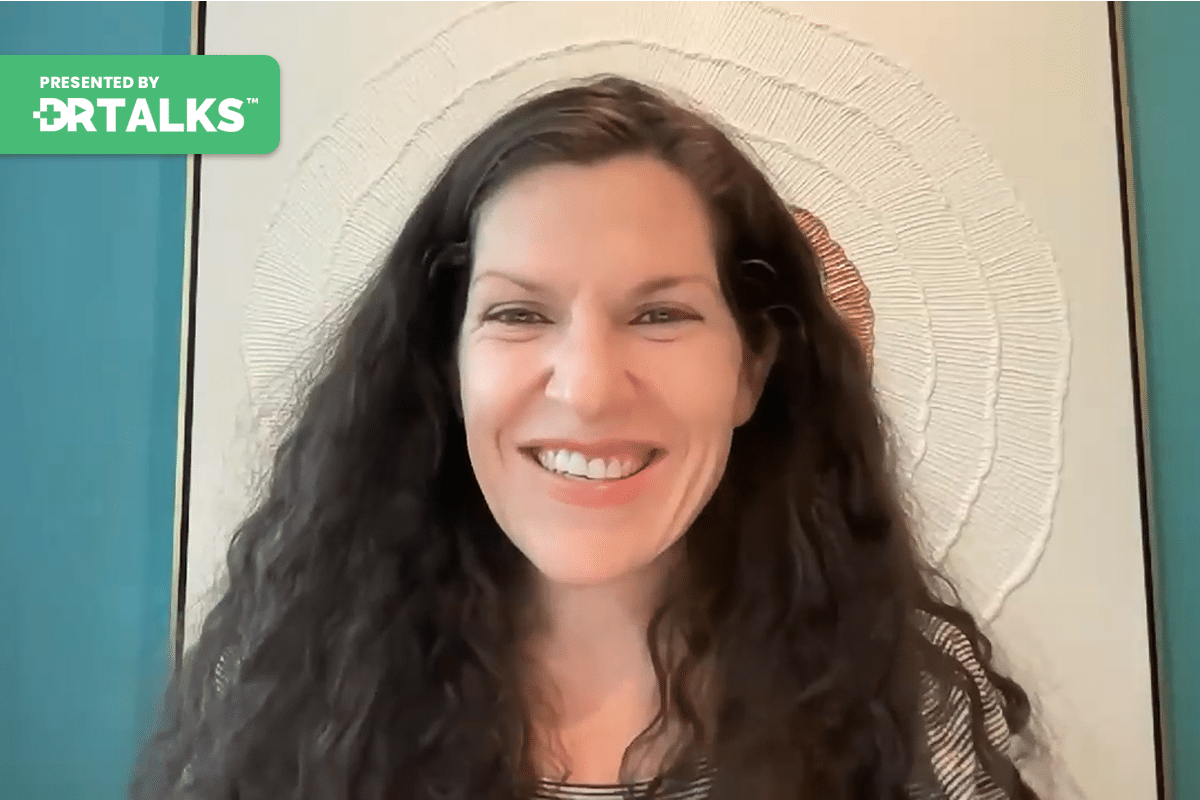Join the discussion below

Kashif Khan is the Chief Executive Officer and Founder of The DNA Company, where personalized medicine is being pioneered through unique insights into the human genome. With the largest study of its kind globally, The DNA Company has developed a functional approach to genomic interpretation overlaying environment, nutrition, and lifestyle... Read More

Dr. Sandra Scheinbaum trains people to become Functional Medicine health coaches and helps practitioners find coaches for their practices because she believes that growing the health coaching profession will be the solution to combating chronic disease and lowering healthcare costs. As founder and CEO of the Functional Medicine Coaching Academy,... Read More
- Reflect on your eating habits to identify if binge eating is holding you back, and muster the courage to break free
- Realize how solitude affects your habits, and foster positive social connections to support your well-being
- Use time restriction as a transformative tool to take control of your eating habits and liberate yourself from the cycle of binge eating
Kashif Khan
We are honored to have with us today Sandra Scheinbaum, who I’ve known for some time now, but never got to do this interview and dive into your knowledge. But first of all, thank you for joining us.
Sandra Scheinbaum, PhD
Thank you. I am thrilled to be here.
Kashif Khan
So that everybody knows what we’re going to be talking about, binge eating and how fasting may support that or not support that. We’re going to find out from you what your thoughts are. This is where people will say, Oh, I wish I had a coach. I wish I had somebody to train me. Sandra has trained hundreds or maybe thousands. I got the number wrong, probably.
Sandra Scheinbaum, PhD
Thousands. Yes.
Kashif Khan
Thousands of coaches on how to support people at work. Getting right to the source now of the person who’s taught all these health coaches how to do what they do. They’re out there now supporting people. They all came from you, which is amazing, the ability to speak to you about all this. Thank you for that. What we’re going to talk about today is how fasting time, restricted eating can affect binging and some people don’t even know that they are binging. It’s really like this, first of all, called awareness moment. What do you even consider binge eating to be like? How does someone even know that that’s a problem?
Sandra Scheinbaum, PhD
Sure. First of all, there are differences between somebody who is just overeating at a Thanksgiving meal and they just eat a lot. They have second and third helpings, and it happens infrequently, often during special celebrations like that, where we are encouraged to eat big quantities of food. Then there are people who actually have a binge eating disorder. This is where there’s a real loss of control that once they start to eat, there is no stopping, and they may eat to the point where they are stuffed. Now, it’s not bulimia; when someone is bulimic, they are going to binge, and then they’re going to find some way of purging. But somebody who is binge eating they are going to be just at that point where they may want to purge, but they don’t go into that process. But it is dysfunctional, and it can take over their lives. I know because I was a binge eater when I was in my 20s; actually, it started when I went away to college. I remember just not stopping. I went to Northwestern, and it was in Evanston, Illinois, and there were ice cream shops like Baskin-Robbins. I would go to one and get an ice cream, but that wasn’t enough.
That would trigger something where then I would go and I would get a second one, and then sometimes I would eat a whole pint of ice cream at a time. I remember things like I would eat to the point where I was so full and then I would throw it away. But then, when I got that, I wasn’t full. An hour to three hours later, I would even be digging it out of the garbage can, and people who have binge eating issues would do that. So when we talked, I was very hesitant to talk about calling something a disorder because that labels you, the person. Now it’s like you have a label; I have a disorder; there’s something wrong with me. Whereas we all have the capacity for self-regulation. In this area with food, it is really challenging. Maybe we can say no to consuming too much alcohol. We’re not binge drinkers, but eating can be very addictive. And when to stop being able to do that is really, really challenging.
Kashif Khan
It’s interesting that you separate alcohol and say that it may only happen with food because the way we understand binging at the genetic level and this is one answer; it’s not every answer. Is that some people bind dopamine much more efficiently than others? It’s very easy for them to experience pleasure, and their clearance, or their clumped enzyme, is a little slower, so they get stuck. They’re feeling away way up here, and the clearance is so slow that they’re just in this endless loop. It’s like all the walls are starting the process over again while it’s happening, and they keep going and going. But then that would apply to anything. What you’re saying is that this is a separate issue that’s only related to food. Is there anything to be said about emotions and other issues, or what drives this? What’s it rooted in?
Sandra Scheinbaum, PhD
Yes. Emotions can be part of it, but there are many reasons. People can start to overeat, and then that can shift into binge eating. When they’re frustrated, they have a call and it didn’t go so well; somebody was angry with them; they’re upset; they’re stressed; and they could eat. But it can also be triggered by just feeling joy, or liking the taste of food. In my case, it was sweets. Many people are going to binge. They’re not going to binge on broccoli. They’re going to binge on chocolate, desserts, and carbs. Some people may eat that whole bag of chips and still not be satisfied. So what else can they eat? It’s a habit. I was a clinical psychologist specializing in health psychology for many years. I saw a lot of people with eating issues, and sometimes it was just liking the taste, and then you lost awareness of your ability to stop it. In other words, it just feels good. You’re eating, and you’re continuing to eat because you like the taste of the food. It might be like, let’s say, ice cream. I was notorious for eating ice cream by the pint. I’m not kidding. It feels good, and it’s a pleasure aspect, and your ability to have that good judgment at the time to apply prudent self-regulation is just out the window. But yes, I was never a drinker. I remember I got drunk once in college at a party, and I was so sick, and I remember just being sick afterwards, and I think, never again. I actually don’t have the genes for the enzyme that processes alcohol, but even if I did, I could say no to that. I could say no to other things as well that require self-regulation. But eating is something that is an issue. The other thing that is often considered when we talk about binge eating is that it’s paired with other activities. Often, if somebody had to just sit there and do nothing else but eat, they might stop sooner. But if they’re watching television or scrolling through social media, they’re not aware that they’re eating so much. Then they may finish what they’re eating and they don’t feel satisfied. Then they search for something else. So that would be another aspect of it as well.
Kashif Khan
Yes, it sounds like this gray area where, like you said, it’s a habit formation problem. That is why we’re so lucky to be speaking to you, because health coaching is about habits. It’s not so much on prescriptive or diagnostic. Now we know what’s going on. How do we actually change our habits and get you to be the new version of yourself? It’s a blessing to talk to you about that. Then I would ask, How do you actually deal with it? Because it’s so gray. It’s not like, Here’s your condition; here’s your pill; here’s your treatment. It’s like step one is like its taste. So awareness is like, How do you even do this? What do you do with this?
Sandra Scheinbaum, PhD
Yes. So step one is to normalize it. Because that’s the problem with calling this a disorder and labeling it. Now, you think you’re damaged, and you think you have this condition, and it starts to define you. There is so much embarrassment or shame. People who are binge eating, I never would be a binge eater in front of other people. In fact, I would go out to dinner and I would refuse the dessert, and then I’d come home and I would down three, four candy bars. It tends to be an isolated activity. The first step is to make it known, to tell people, and that’s what I love so much about time-restricted eating: is where you can tell people that I may open my feeding window at 10 a.m. or at 11, or whatever that might be for you. You have now made that announcement, and then you’ve changed the way you characterized yourself. You start to say, instead of saying, I have a binge eating disorder or I’m a binge eater, which is even worse, like your whole self is that disorder. But you say I practice time-restricted eating. I don’t eat after 8:00 at night, for example. You are now defining yourself that way. You have a different sense of who you are, and you’re talking about that with people in a positive way.
That’s one. The other is habit change, just as you said. For example, a lot of people eat in their cars. Again, this is a solitary activity. It’s a solitary habit in most cases. You start with, Well, where do you see yourself making that change? It might be that you start small; the smaller, the better. It’s okay. Like I am going to stop eating at ten an hour or half an hour before I go to bed, even there. It might not be where you ultimately end up because maybe you want to stop three to four hours before you go to sleep. But a habit builds slowly. When you’re a health coach and you’re working with someone with these issues, I said, That’s great; let’s focus on how you’re going to do this. What are you going to say to yourself when 10:00 comes along or 9:00 comes along and you’ve made that decision? You start there, and the key is to celebrate.
So let’s say it’s 9:00, you stop eating. That would be something. When you do that, you celebrate, and maybe you pair it with maybe turning on the alarm, or maybe it’s something like, Every night at nine, I’m going to do this. I’m going to do something that you enjoy doing. You pair it with something that is pleasurable that is going to take the place of eating. Or it might be that you are habit changing around eating with somebody else or even eating, sitting down. Like every time I eat, I’m going to sit down. When you do that, you celebrate, but you start with, like, one meal. It is a slow process. B.J. Fogg talks about “Tiny Habits”, and that’s how this changes tiny habits.
Kashif Khan
Yes. When I listen to you, there’s one thing that kind of stands out to me. I tried to put myself in the shoes of someone solving this problem, and you talk about solitude and this being a habit of solitude, like being alone. I have my little secret space where I binge eat. I think about change and not having any support, people not knowing, and the advocacy of the people around me knowing that I need and want to change. It’s so easy to slip back into that little cave, my whole whatever it is, my bunker, and hide and do my thing because nobody even knows that this challenge exists. How do you deal with that? Without support, it becomes much more difficult.
Sandra Scheinbaum, PhD
Absolutely. The power of community, the power of social connection. When you start telling people what you’ll find, this is what I found. Oh, I’d like that too. I used to do that as well. I have a friend, and we have attended many events together. I think you were at some of them, and at these events, there were snack tables; those people donated. For me, anything that looks like a candy bar, like the energy bars and the high protein bars, I was addicted to those as well, because it just feels like you’re eating a candy bar, and they have no sweeteners. What we did, and she is actually an expert in emotional eating, and she went to that state as Tricia Nelson because she was an emotional eater. We bonded at these conferences, and we made a pledge to ourselves: we are not going to go to that snack area and start on these bars. Now her voice is in my head, and vice versa. We became accountability partners. That’s one of the beauties of working with a health coach, because there is no judgment or shame, and often people won’t talk about this. They are afraid. It’s shameful. When you have a coach and you are filling in a safe space that you’re talking about with your coach, nine times out of ten, your coach will have been there as well. They’ll get you, and so will your coaches; you hear their voice in your head every time you go, you start to eat more. That’s what’s wonderful about making an announcement about being a time-restricted eater. You’ve put it out there, and now you’re thinking, I’m accountable. I don’t want to go back on my word.
Kashif Khan
You know that there’s that check-in call coming in a few days. There’s an accountability call, and progress is obvious. If things haven’t changed, you can’t lie your way through it. When you’re dealing with a coach, you can perhaps lie to yourself if you’re alone, but not when you’re working with somebody. That’s very important, and that’s why coaching is successful for people. Then there’s community confinement; I’m sure there are Facebook groups and places you can go where there are other people that you’ll see that are struggling. When you put these groups together, the support makes it more powerful and easier to get through. When someone is going down this road and says, Okay, step one, I’m going to acknowledge this. Step two: I’m going to take action. I might bring a higher coach. I might go to a group and start learning. Where do you see people failing and things falling apart?
Sandra Scheinbaum, PhD
I’m glad you brought that up because it is not all or nothing. That’s where people get into trouble. They make the decision, Okay, I’m going to not binge eat. I’m going to eat three meals a day; I’m not going to stack. Then they find themselves doing it, and they say, Oh, I’m eating; I’m devouring this bag of potato chips. Now they say to themselves, This is why most diets fail; I blew it. It’s all over. I blew it. I’m worthless. I can’t do anything right. I’ll never overcome this issue. Why can’t I stop? When they have that thought in their head, that is like saying, Okay, I can eat more. Or they might say, This is a good day; this is a bad day; this is my albeit day where I’m binging. I might as well continue, or I’ve just had company and people brought desserts, and I’ve got all of this in the house, so I’m just going to eat it all up and throw half of it away, and then I’ll start fresh tomorrow.
It’s that thinking that is really self-sabotaging. I would always tell people that wherever you are, you can be holding that spoon or fork and about to eat something when you make that decision. No, I’ve had enough, so you put it down, and then you focus on celebrating your restraint. Wherever it was because we are all humans, we are not robots, we are fallible, and therefore we’re going to screw up. When you say, Okay, I am following time-restricted eating, I’m going to only eat from, let’s say, 10:00 to 10 a.m. to six p.m., and then you find yourself at a dinner and it’s seven, eight, nine, and you’re eating, and Oh, I blew it. You get very discouraged, as opposed to saying, I’m going to do this 99% of the time, because it took a long time to develop the bad habits; it didn’t happen overnight. It still takes a while, and it’s never perfect. We can’t do it perfectly. That’s where people often get depressed and down on themselves. But as opposed to, let’s say, you are charting as if you were doing a research study and you were plotting or like a stock market and you were following, you’re doing trend lines. Now you might say, Oh, yes, I’m on an upward trend. It’s getting better, but it’s never looked at, I’ll have to do this 100%, no exception. I’ll never eat before 10 a.m. again, for example, because that is where you do yourself in.
Kashif Khan
So that made things easier for me. When I first started off saying, I don’t eat sugar anymore, and I still say that about myself, I don’t eat refined sugar. That’s challenging because there are events, family birthdays, parties, and kids stuff going on. The world is still happening around you. Last night, I’ll admit it, I actually had apple pie and ice cream. I didn’t care. It didn’t bother me. Why? Because I know I’m on that upward trajectory, like you said. I know that I’m doing things so well for the majority of the time that once in a while, it’s almost like I’m doing things so well that my body is ready to take that hit on the day I need to do it. There’s a wedding where I just can’t say no. I’m at my mom’s house, and she’s forcing something down my throat. I just can’t project it. If I do everything and control the majority of my time, then I’m prepared for that once-in-a-while problem that I otherwise wouldn’t have wanted, and I get to enjoy things once-in-a-while with the people I want to enjoy them with. I’ve prescribed that myself, and that makes it so much easier for me to make things happen.
One of the things you said when it comes to missing out on this pleasure, and I’m saying, No, as the spoon is right here, what people have to realize is dopamine. This thing that allows you to feel pleasure also allows you to feel reward. Both of those things are satisfactory. So you can actually shift gears and no longer need the pleasure if you get hooked on the reward, which is a much more positive way to experience satisfaction. This is what ends up happening to people. The last time I talked to you, you were bouncing up and down. I was like, What’s going on with Sandra? I realize you were walking on a treadmill during a Zoom call. This is what ends up happening: you get hooked on reward and achievement, and that becomes your new binge, which is a healthy place to be. You can replace the bad habits you don’t want with better ones because they both provide you satisfaction. You don’t need to have pleasure, necessarily.
One question for you, just from listening to you again. With time-restricted eating, somebody changes their habits. There’s a small eating window. They may walk into that or run towards it; how they get there is different for different people. If somebody has a history of binge eating, which seems like their relationship with food is a bit problematic, could they then develop other problems? Some time-restricted eating, like I don’t eat food, Like the things you were talking about earlier, the anorexia and bulimia, could that spin itself the other way? Have you seen that happen?
Sandra Scheinbaum, PhD
Certainly, it can. That’s where being too rigid comes in. It’s so you would want to be really careful in what you are telling yourself and the rules you are setting up. It would be desirable; I want to narrow my eating window, and then you would also be part of that because you could have a narrow window, but you might be snacking all day. That would be done if you narrowed it down to, let’s say, not starting eating until a certain time in the morning and cutting it off at night. But what if you’re eating the entire day, or what if every meal is a massive binge? Then you would address that issue and raise awareness of when your rules are too rigid. Because it would be less likely that you would become anorexic. I do want to preface everything I’m saying, but if you are anorexic, if you are bulimic, if you are binging and then purging, you definitely want to work with a licensed mental health professional. You want to be in therapy; you want to get help for that eating disorder. With binge eating, it’s easier to work with a health coach. It depends on, again, how severe the issue is. There’s always a whole spectrum.
We’re not talking here about people who have serious binging and purging disorders or serious anorexia. What can happen is that people can become what we’re now calling orthorexic, where you tend to set too many rules. If I’m not careful, that could be me, where I might go into a restaurant and there’s nothing I want to order because I can see the danger in everything. Well, the fish has mercury; it’s not pasture-raised; it’s not grass-fed beef; and the oils that they’re using are not organic. Then again, at the point where you are suffering, the stress of that is probably more deleterious than if you were to eat something.
I was at a dinner recently where they didn’t start serving. It was called for six, and by the time people sat down they didn’t start serving until seven. That was this dilemma, and it was a whole roundtable of people I had never met before. Do I want to be this oddball? All right, I don’t typically like to eat after six or seven o’clock. Here was this dilemma, as well as the food itself wasn’t food that I would care to eat under normal circumstances. The rigidity and the issue of what if I had eaten a little bit and socialized and earned and enjoyed the company of those other people? That’s why it’s when you set too many rules, and it’s 100% of the time that you are telling yourself, I must follow these rules, no exception. That’s quite stressful. The pleasure of being at a social event and relaxing your restrictions a bit is still not going to have the hot fudge sundae that they served as a dessert, for example, because I know that I have blood sugar issues, which probably came from all those years of binging on sweets. That’s an area where I am more adamant. But in terms of just having something to eat, passing my feeding window is not going to be a catastrophe.
Kashif Khan
This is where your point of community becomes so powerful, because when you have habits changes, you have them, but everybody else in your life maybe doesn’t. Now, you have to go and bring those habits into your reality, and they don’t fit because nobody else believes in them. It doesn’t mean that you need to purge your family and friends. It just means you need to have some new friends that do both, think the way you do, and support it, and people that have the same habits that you can talk to and even meet up with potentially. It makes a big difference, and you’re going to evolve in that direction anyway. Anyone who purposely drives themselves towards change will often stumble across people who are on the same path, because that’s what drives success. You have peers that are doing the same, and it just makes everything so good.
Another thought is that I’m thinking about, again, just practical terms, somebody binge eating. The way you suggest it, it’s typically going to be like your soul food. It’s going to be ice cream, sugar, and fatty stuff. Not that fat is bad, but it may be in, say, snacks like Doritos, for example. That’s the wow factor flavor. You’re in it for the flavor. You’re not in it for the nutrition protocol. I’m assuming then it comes with its other sort of multitude of problems of gut issues and inflammation. There are probably other things that are coming out part and parcel of this eating style that you may not even associate with it because they have their own clinical labels that also get resolved.
Sandra Scheinbaum, PhD
Absolutely. The more you are eating, we don’t binge on, again, broccoli, but we’re bringing on ultra-processed foods. Yes, you are going to have other health issues that will be mistaken for inflammation. I was able to hide when I was doing pretty well because I was never obese. I certainly was not healthy back then, and I was overweight, but it wasn’t so obvious. Another issue that we haven’t talked about is that the food industry wants us to be binge eaters. They want us to be there because it will sell more products. If we’re a company that has these chips, you can’t just eat one; you have to eat the whole bag. Their whole research is on that magic combination of sugar, salt, and fat that’s going to have you eating a whole lot more of these types of foods.
Kashif Khan
Yes. The flavor profile, the texture, the low fat profile, and the satiety of the palate are like, Oh wow, this is amazing. I can’t stop. It’s literally designed to work against you. You might have to go purge the pantry. I don’t know how, when it comes to coaching, how do you actually do that with people. Is that actually what happens?
Sandra Scheinbaum, PhD
Oh, absolutely. You would say, What foods do you want around you, and what foods would be trigger foods for you? You avoid them, and then you are really being understanding and kind to yourself to know that this does not happen in terms of getting to be in a better place, in a better relationship with food. It doesn’t happen overnight. You may start by setting up the time-restricted pattern by saying, I’m going to, every time I get into the car, I am going to drive. You have different habits. Every time I finish dinner, I’m going to have a cup of tea. That’ll be my signal that my reading window is closing. Something that I wanted to bring up was when you talked about dopamine and pleasure. There is that immediate satisfaction, but the real pleasure is the enjoyment of working towards something that is really important in your life. Health coaches will ask those questions, like, What do you want your health for? Where would you like to be in five or ten years? What is most important to live for? Then they might say, whatever that might be, I want to be around and see the birth of a grandchild, for example, or whatever that might be, and that becomes what Richard Wyatt talks about as a positive emotional attractor. In other words, just imagining that and picturing it puts you in a really good, sympathetic state.
Some people are motivated by negative and emotional attractors. It’s valid but not as strong as getting to the PEA, but the negative emotional attractor would be, I better stop eating this because I don’t want to be diabetic. I don’t want to get cancer or heart disease. It is the negative consequence that is scaring you, and now you’re going to change your behavior. A health coach works with people to say, Which one are you? It could be both. I know for me I’m both, but because I will be, I was sitting at dinner with people the other night and everybody got desserts, and they were saying, How can you not like it, you’re so good? How can you not order this or take a taste? What I thought was, Well, I know I have. I’m wearing my CGM, my continuous glucose monitor, and I know that if I went down that road of eating that dessert, that would set off cravings for more. Because sugar is so addictive physically, and I don’t want to be pre-diabetic or diabetic. So that is a strong enough negative emotional attractor for me in combination with the positive. I want to be energetic, I want to be strong, and I want to live a long time, even though I’m 73. So I have a lot of reasons to cultivate good food habits.
Kashif Khan
Yes. You’re 73 based on how many birthdays you’ve had, but if you compare yourself to the average American, you’re running a company, coaches are relying on you to learn, you’re innovating, you are running, and you are walking on a treadmill while talking to me on Zoom. You’re 73 is not your label at all. You’re living like the average 40-year-old right now.
Sandra Scheinbaum, PhD
I try to. Thank you.
Kashif Khan
That makes me think of this whole thinking around what you just said about the positive versus the negative and those choices, and even the awareness that these are choices, like chronic disease is an option. This choice of how you’re going to eat is not just about the calories and the weight. The longitudinal effect of the insulin response and the inflammation and everything else, mood and behavior issues, serotonin dysregulation, gut disruption, and all this stuff, you are making a conscious choice to eat towards health or to eat towards pain. That power of knowing that it’s your choice when it comes to chronic disease, Is this something that health coaches are able to support people with?
Sandra Scheinbaum, PhD
A 100%, a 1,000%, yes. It’s through that conversation where that person feels supported, they feel heard, they feel like they are in control, and coaching builds self-efficacy. That is where you get the sense that, Yes, I do have the ability to change. I can do this, and it’s not going to be linear. It’s going to be hard; there’ll be setbacks, and that’s accounted for. But they’re excited by the idea that I don’t have to be stuck in this pattern, and I just don’t like that. I have this disorder, and I have to suffer with it. I can’t change, and coaches can focus on those times when you do have self-regulation. If we’re talking about not being able to stop eating, that’s inaccurate. There comes a point where you stop. Maybe it was after you had two pints of ice cream and half of that chocolate cake. At that point, you got the signal, I can’t eat one bite more, and you stopped.
Now let’s backtrack. Let’s pull back, shorten that window of eating, and have the sense that I’m doing this. You have this practice every day where you say, I am a time-restricted eater. I am going to enjoy my food between ten and six. I’m going to have a great lunch, breakfast. I’m going to look forward to having something at dinner. There are issues we haven’t talked about the nutritional aspects, but obviously, like when I was binging on carbs, I was nutritionally deprived. I didn’t have the right minerals, and I didn’t have enough protein. Coaches are not nutritionists, but they can help people make the decision to have more balanced eating in terms of micro- and macronutrients. That will help you have more self-regulation because you’re feeding your brain’s executive functioning abilities. Now your decisions every day will be better because when you are binging, and typically people do binge on high-carb foods, you are also eating foods that are loaded with bad seed oils and other toxins. All of that is hijacking your brain, and so the next day you’re going to binge again because you don’t have the right nutrients for your executive functioning.
Kashif Khan
Yes. When you talked about it again, you mentioned time-restricted eating. I think of it like a hack, like you’re creating it; call it a biohacker, to force yourself to do something that gets you to your goal. I’m thinking, Well, what other hacks may there be? I remember hearing at this lecture about this Japanese, I guess, theory around eating, and I might be getting this wrong, but I think it was called Hara Hachi Bu, which essentially means you’re somewhat full with food, somewhat full with water, and somewhat empty space. Can people relearn what it actually means to be full? We think full is like, I can’t stuff anything else in. My gut is puffed out, and like that, it’s full. Truly is the word for that in the literal sense. But what is full? Can we relearn what that is like? How much am I actually supposed to eat? Why not stop and have a little bit of water and a little bit of empty space?
Sandra Scheinbaum, PhD
Yes, that is something you can cultivate as a habit: pausing and eating slower. Most people eat quickly. They eat standing up; they’re rushed, forcing themselves to chew more and a lot and then eat more slowly to not multitask. That tends to be difficult for a lot of people. You may start slowly and again; it’s like wherever you’re going to start. So maybe I’m going to take the first few bites of food and really savor them. There is a saying that the taste is in the first bite. Often, you may not realize afterwards that you have actually enjoyed this and really savored it. There’s an old exercise that comes from gestalt therapy. It’s been used a lot in mindfulness training, and that is where you take something like a cracker, a piece of chocolate, or a blueberry and put it in your mouth and hold it there for so long. But it begins to break down. The exercise with the cracker is that you now start to taste the butter and the salt, and you’re getting these different components, and it’s complete mindfulness of breaking that down.
So that is an exercise, but that has traditionally been useful where people get the realization, like, Yeah, I’m just swallowing my food whole; I’m not even realizing. Often, there’s no joy in that binge eating, but there would be more joy if you were to slow down and really savor, like if I were to take one spoonful of something like ice cream, let’s say, and really taste it, or savor the taste of sweet fruits. When you binge on sugar-laden foods, your taste buds are hijacked. You may not taste the sweetness of a carrot, for example. When you are eliminating that or not binging, you really can savor the taste. There are many ways that people can work with this to feel like they are in control and that the food is not controlling them.
Kashif Khan
Yes, that’s amazing because you can really change your perception of what it means and then change. This is, I think, a really important place for people to start: to learn what they don’t know about what it means to be full and what it means to satisfy themselves. Satisfaction doesn’t need to be gobbled up. It could be, like you said, savoring it. I’ve done this where, and I’ve done it actually with the fruit, which is why you just reminded me of that, where it was so powerful I just kept chewing on chewing. You don’t need as much because you got the satisfaction that the dopamine hit just arrived in a different way as opposed to volume: through quality. In terms of fasting, do you see any difference between the average man and the average woman in terms of protocol? Like, is there anything we said, or is it just like everybody needs to be doing the same time restriction?
Sandra Scheinbaum, PhD
I think it’s highly personalized. I don’t think one size fits all. Also, how men approach eating: I’ve taught a lot of courses in the psychology of eating, and there are gender differences. A lot of them are culturally reinforced. But if you look at women going out to lunch, they’re going to order salads, and men would see salads as more of a female kind of food. They might like to have a big steak and potatoes. The steakhouses are decorated usually in a more masculine way, and so we do have these food rules and patterns that are different. Men may also, biologically, have reasons why they do better with fasting. Women, in terms of just really being aware when you’re looking at fasting. Why are you doing this? Often, if somebody has been binge eating or has blood sugar dysregulation, going on a full fast might be difficult. You might want to do it under medical supervision. I think that what we’re talking about is looking at a way to notice what happens when you don’t eat and get used to that feeling.
I remember if I didn’t have, as we’ve always been told, you have to eat within a half hour of waking up, and before I had my blood sugars under control, I would feel really bad before I ate and feel like I needed to eat. Now, I can go much longer without eating. But you want to again look at this as personalized. You want to look at balance, and sometimes you can. We often think that if something is good, then a lot of it must be better.
If fasting is good, how do you have to fast longer? If time-restricted eating is good, I have to fast. I have to time restrict longer, and be down to one meal a day, which, by the way, might not be the best way for people with binge eating issues. Because if you bottle it all up, let’s say you open your feeding window at four or five, and now you have one big meal, that will be like a Thanksgiving meal. Yeah. Because, Oh, this is my only chance to eat, and you’ll keep eating and eating. That might not be the best approach, as opposed to having two or three meals during the day.
Kashif Khan
I’m just saying that’s so true. We see that all the time with people who are on this one meal a day. It’s like the spread that gets laid out edge to edge on the table that just every animal, fruit, and plant you can think of has been cooked that night. It’s because, Well, I’m getting all my calories in; that’s the total. No, the total adds up pretty quickly, and what about for you personally? Are you seven days a week, or what are you doing?
Sandra Scheinbaum, PhD
Yeah. I do.
Kashif Khan
When it comes to fasting.
Sandra Scheinbaum, PhD
Yes. My issue now, at 73, is avoiding sarcopenia. I really am paying attention first and foremost to protein, and I follow the suggestions from Dr. Gabrielle Lyon, a friend of mine, who talks about one gram of protein per pound of body weight, or ideal body weight. For me, that means getting 90–95 grams of protein. I can’t. I don’t want to do that in just one meal; I couldn’t do that in one meal. I spread it out. I used to be doing two meals a day, opening my eating window around noon and eating dinner at six. Now I’ve experimented with opening that sooner and having a lot of protein at that first meal, like 30, 40, and 50 grams of protein, and then a bigger amount at the evening meal as well, and then a smaller amount at lunch. But having that balance, because I also do a lot of physical activity, I weight train three or four days a week, at least four days a week, actually. Because of that, I really need to make sure that I’m getting enough protein to avoid muscle wasting.
Kashif Khan
Yes. As you age, it’s so important because people don’t realize it. One of the major causes of death is just frailty. People are just getting old. We think about disease. But what about the people that didn’t have a disease? How did they die? They slipped in the bathtub, or they couldn’t get around it. That’s still true today. It requires muscle, and muscle is also where you metabolize your glucose and avoid getting diabetic. Anyway, the benefits are obvious and clear, but you need to maintain them. What other changes did you see when you changed from lesser or more condensed meals to spreading them out a little more? Did your body change at all? Did your mood change?
Sandra Scheinbaum, PhD
Yes, I was. My workouts were better. Now I always make sure that I tend to do most of it In the morning. I’ll do yoga and pilates just because I like to do those on an empty stomach. It’s hard doing inversions when your stomach is full. It doesn’t feel so good. I will do that, but then I will have something. I’m sensitive to cow’s milk, so I will do something like goat whey protein and have that gigantic shake that is very high in protein. What I have found is that when I emphasize protein first, also that carb craving has completely gone away because, for many, many years, in my 30s, 40s, and 50s, I was a vegetarian, then a vegan, and a raw vegan. I’d gone through it all because that was what we thought was healthy at the time. But I, especially because of the carb cravings that I had and the sweets, was still in the transition from being a real binge eater on sweets in my 20s to being plant-based in midlife. That was not the best for me because I was still craving those huge meals that I was a carboholic. It wasn’t until I went to high amounts of protein, particularly animal protein, that I’m feeling like I’m satiated and I no longer have that craving. So, I can be at a restaurant with people who are all ordering desserts or pastas and know that I’m not going to be craving that or coming home feeling dissatisfied and eating every carbon sight in the kitchen.
Kashif Khan
Amazing. Well, this has really been helpful, and it’s been really even more helpful that you opened up your personal story and told what you were able to do and achieve because that’s inspiring to people to say, Well, if Sandra used to have her nutrition plan was a pint of ice cream every night, she can turn that off. Well, I can too. It’s even just the awareness of people not even knowing that they’re doing it for a step. A lot of people don’t. From what we see. So this is awesome. If somebody does want to work with a coach, I know you train them; you don’t necessarily run coaching per se, unless I’m getting that wrong. But how does somebody actually find somebody to support them?
Sandra Scheinbaum, PhD
Yes, they can go to a functional medicine coaching dot org and they can go to find a coach, and many people may decide that they want to be coaches themselves, whether they because people who may be suffering from particular conditions now they feel a calling to serve others. So we would welcome you because the world needs so many more health coaches with so many people metabolically unhealthy.
Kashif Khan
Yes, and you’re doing amazing work there. This is true. You’ll find that most great coaches and functional medicine practitioners came from a background of needing to solve their own problems. The passion is there. The belief and understanding are there because whatever was conventional failed them. They did get that label. You have an eating disorder. Good luck. Let’s manage it, versus, No, this is how we can unwind this thing. It doesn’t need to be like this. You can have a different reality. I would urge anyone: Is it the same website for anyone who wants to understand?
Sandra Scheinbaum, PhD
Yes, they can. If they can get a coach, if they’re a doctor, they can hire a coach or refer to a coach, or they can become a coach themselves. You don’t need a background in health care, which is so cool. The best coaches often have no background as health care professionals.
Kashif Khan
Yes, that’s amazing. Well, thank you, Sandra. This is an eye-opening conversation. As expected, you had years of experience and having trained so many coaches yourself. I’m sure somebody listening is like, Wow, I didn’t know I could actually solve this problem. So thank you so much.
Sandra Scheinbaum, PhD
Thank you. It’s been a pleasure.
Downloads

